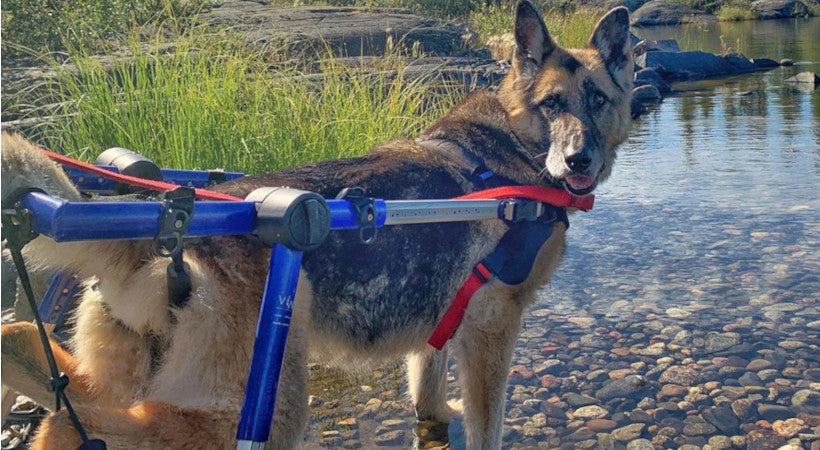Pomeranian Lifespan: How Long Do Pomeranians Live? (Life Expectancy)

Common German Shepherd Health Issues
Our dogs mean so much to us; we want them to be around for as long as possible. By knowing what health conditions to keep an out for, you’ll be better able to detect and address warning signs early. Understanding common German Shepherd health issues that they may have a predisposition to can help you maintain your dog’s well-being.
Hip Dysplasia
Hip dysplasia is more common in large-breed dogs. It is hereditary and comes from an improperly formed hip. As the ball and socket do not fit together perfectly, they tend to grind and rub together rather than moving smoothly, causing pain and discomfort. Improper exercises, excessive growth, lack of sufficient nutrition in the diet, and unsuitable weight can exacerbate symptoms and pain.
You can take preventative measures to aid in the proper development of your German Shepherd’s joints. Speak with your veterinarian about progressive and supportive exercises, diet options to prevent rapid growth rate, and supplements such as glucosamine to foster joint development and health.
Degenerative Myelopathy

Degenerative Myelopathy or DM is the the most common mobility condition impacting the German Shepherd breed. At least 35% of all German Shepherds carry the genetic mutation for DM. Although that does not mean that they all have the condition, it is possible for them to pass it along to their puppies. Signs of DM usually present later in a dog's life, and although not preventable, the only way to know if your dog is at risk is to have genetic testing done. The disease is impossible to cure and eventually leads to progressive German Shepherd mobility loss.
Early signs of DM in German Shepherds include:
- Hind leg weakness (worsening over time)
- Dragging nails
- Difficulty rising
- Stumbling or swaying
- Knuckling of paws
- Muscle loss
All GSD with DM will eventually become paralyzed and require a wheelchair to maintain their active lifestyle. Although not curable, there are ways to manage a dog's DM symptoms and improve the quality of its life.
Gastric Dilatation Volvulus
Gastric Dilatation Volvulus, also known as bloat, is a condition that affects many dogs. It often occurs with a build-up of food, fluid, or air in a dog’s digestive tract and an inability to release the gases. Sometimes the stomach can twist, blocking gas from escaping through either the stomach’s opening or exit. This condition needs immediate treatment because leaving it will result in severe infections within the stomach that could cause death.
Because bloat is sudden and life-threatening, seek medical attention immediately. If your vet’s office isn’t open or nearby, consider an animal emergency room. As a vet will need to attend to your dog within an hour. Pay attention to warning signs. Restlessness after eating, an inability to sit or lay comfortably, sudden anxiety or pacing, attempting to vomit, a stomach that looks abnormally bloated, excessive salivation and whining, and an increased heart rate and labored breathing.
Megaesophagus
In most cases, megaesophagus in German Shepherds are congenital. This condition a combination disorder that causes the esophagus to enlarge and lose the ability to move food into the stomach. Since food and water are unable to get to the stomach, it builds up in the esophagus and causes pets to regurgitate. Symptoms will typically begin to show around 5 weeks old, as the dog is just starting to eat solid food. If diagnosed as a young pup, the dog will not grow properly, and many puppies do not survive. If the dog is a little older when diagnosed there may be a noticeable drop in weight.
Treatment for megaesophagus includes managing the symptoms. Switching to smaller meals in a raised bowl or using a Bailey chair. Bailey chairs are designed to help a dog sit up and supports them in such a way as to promote proper internal food mobility. It is a condition that pets can grow out of, this usually occurs around 6 months old.
There are many conditions to which larger dogs are predisposed. It’s essential to educate yourself on the possible health risks when becoming a dog parent. Allowing you to respond quickly to the signs of pain and discomfort in your pup, leading to better health and happiness. Being able to identify common German Shepherd health issues will ensure that your Shepherd has the best chance at a long and robust life.
Related Articles:








